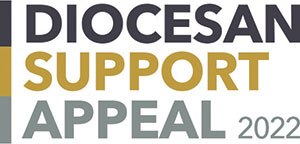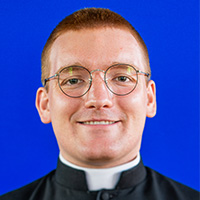 From: Huntersville, N.C.
From: Huntersville, N.C.
Age: 23
Home parish: St. Mark, Huntersville
Status: Started Mount St. Mary’s Seminary, Cincinnati, August 2022
Favorite verse or teaching: The explanation of the Immaculate Conception of Mary, as affirmed by Pope Pius IX in his 1854 encyclical “Ineffabilis Deus” (“Ineffable God”)
Favorite saints: St. Joseph and St. Thomas Aquinas
CHARLOTTE — Instead of throwing Hail Marys on the football field, seminarian Bradley Loftin opted for another path in life – offering prayers instead of passes – when he entered St. Joseph College Seminary in 2018.
Loftin, 23, attended St. Mark School and Christ the King High School in Huntersville, where he enjoyed playing both basketball and football.
“I really wanted to go play college football, but instead of pursuing that, I decided to pursue the priesthood,” Loftin says. He credits his high school chaplain at the time, Father Paul McNulty, and his pastor, Father John Putnam, for fostering his vocation.
“Without speaking to Father Putnam about my vocation, I can say I wouldn’t have pursued it,” Loftin says. “He told me that I would have many difficulties and that I would never make the right choice without prayer. I signed up for a weekly Holy Hour. I asked three of my friends to join me. Now, four years later, three of us four are in seminary.”
Loftin and eight of his brother seminarians graduated from St. Joseph College Seminary in August and now attend Mount St. Mary’s Seminary in Cincinnati – among 49 men currently in some stage of formation to serve as priests in the Diocese of Charlotte.
He reflects on his journey in a conversation with the Catholic News Herald:
CNH: When did you first hear the call to a vocation to the priesthood?
Loftin: I first heard the call when I was a junior at Christ the King High School. I realized that the life I was living wouldn’t fulfill me. I wanted to sacrifice my life for something noble, and I knew I wasn’t living a life that would make me happy. When I saw the priests around me, I saw men who gave their lives to save souls. I knew I had to make a change. While I was afraid of making it public, I knew I had to pursue what God wanted from me in discerning a call to the priesthood.
CNH: What have you been doing to help deepen your discernment during your time in seminary?
Loftin: Since entering the seminary I’ve really enjoyed teaching and giving instruction about the faith. When St. Joseph College Seminary was still near St. Ann School, I would go there in my free time. During breaks now, I enjoy going to St. Mark School and teaching about the faith there and at home-school groups. There is no greater sight than to witness someone learning about God and then beginning to grow deeper in their love for Him.
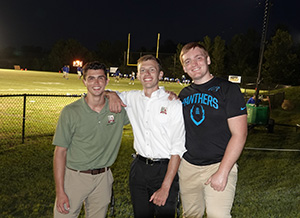 Charlotte seminarians Christian Goduti, Matthew Harrison II and Bradley Loftin are shown at a Christ the King High School football game in Huntersville in 2018. Loftin credits their friendship for helping him discern his vocation. All three men are now studying at Mount St. Mary’s Seminary in Cincinnati, Ohio. (Photo by Amy Burger)CNH: Can you share an example of how your interactions with students are making an impact?
Charlotte seminarians Christian Goduti, Matthew Harrison II and Bradley Loftin are shown at a Christ the King High School football game in Huntersville in 2018. Loftin credits their friendship for helping him discern his vocation. All three men are now studying at Mount St. Mary’s Seminary in Cincinnati, Ohio. (Photo by Amy Burger)CNH: Can you share an example of how your interactions with students are making an impact?
Loftin: One of my favorite moments was when I visited St. Mark School and was able to answer the questions of the students. One student asked me what my favorite part of seminary was. When I replied that I loved the connection of prayer and fraternity at the seminary, the young man’s face lit up with excitement. I think back to this interaction as a motivation to keep spreading the joy that comes with the life that God provides for seminarians and priests.
CNH: Have you acquired some new skills since you entered seminary?
Loftin: Something I have learned is maintenance work. In my summers, I work at St. Mark as part of the maintenance staff. This has required me to learn new skills, from plumbing and electrical to maintaining landscaping. I think these skills will be a great help to me in the priesthood, as maintaining the church and grounds is a critical part of parish life. The skills I’ve learned will be able to assist me in that.
CNH: What advice do you have for a young man discerning a call to the priesthood?
Loftin: My advice is to listen to the angel in the first chapter of Matthew’s Gospel: “Do not be afraid.” While you may have fears about discerning the priesthood, realize that God will give you the grace to be His priest. God will strengthen you to follow Him, and He will lead you. Trust in the Lord so that you may discern.
— SueAnn Howell
Your DSA contributions at work
Seminarian education is funded in part by the annual Diocesan Support Appeal. Learn more about the DSA and how to donate online at www.charlottediocese.org/dsa.
‘Bring Christ to the world’
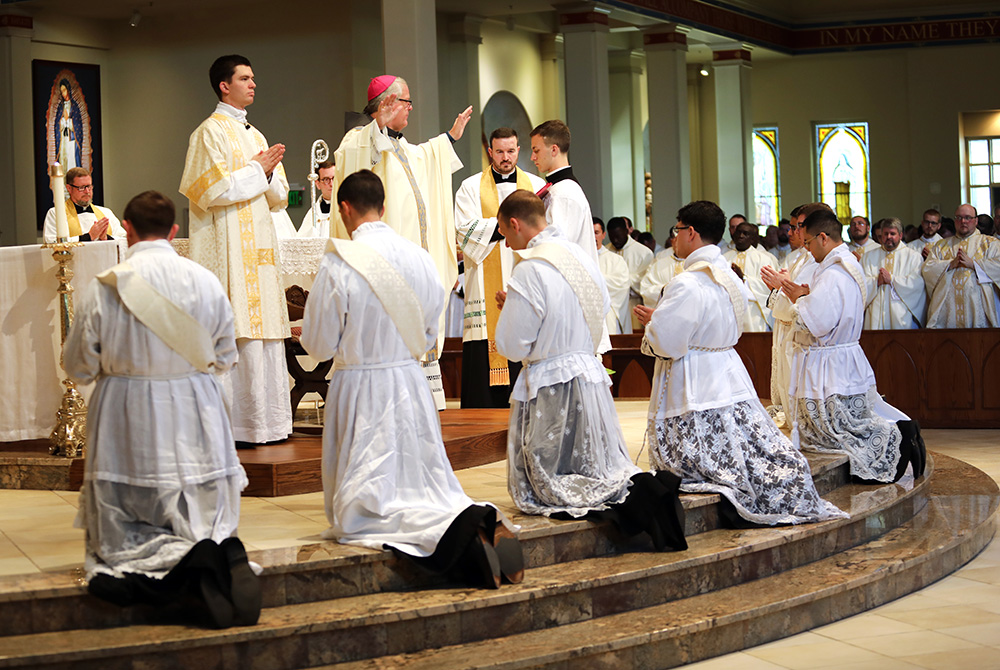 HUNTERSVILLE — Seven men heard the call to bring Christ to the world and to always “err on the side of mercy” as they were ordained priests for the Diocese of Charlotte by its new bishop on Saturday, June 15.
HUNTERSVILLE — Seven men heard the call to bring Christ to the world and to always “err on the side of mercy” as they were ordained priests for the Diocese of Charlotte by its new bishop on Saturday, June 15.
The new priests are Father Matthew Dimock, Father Christian Goduti, Father Matthew Harrison, Father Kevin Martinez, Father José Palma Torres, Father Elliott Suttle and Father Kevin Tran.
It was one of the largest-ever classes to be ordained at one time – evidence of the diocese’s strong commitment to vocations – and it was Bishop Michael Martin’s first-ever priest ordination.
About 2,000 people – including family and friends of the new priests – turned out for the Mass, filling the pews at St. Mark Church in Huntersville and overflowing to the parish hall.
At the start of the ordination rite, the seven men stood in front of Bishop Martin and declared their willingness to be ordained and take on the duties of the priesthood.
This was followed by Bishop Martin’s stirring homily. Infused with humor, it focused on the multiple roles the seven would fill through their priesthood and how hungry the world is for their ministry.
“Your role is to take the good news to the world, not just to wait for the world to come to you,” Bishop Martin said. “We know that the heart of the good news is the message of Jesus Christ…and how that gets understood becomes dependent on the seven of you, how your voice will be a prophetic one in a world of many, many voices. You have to be men who go out into the world and show that there is a greater good that can only be found in Christ.”
The bishop said some of their most important moments as priests will come in their service to people in crisis.
“To be a priest is to be the means by which the world receives the saving grace of our Lord…and we know that for so many people that grace is so beautifully made real in difficult moments,” he said. “You will anoint people who are afraid, people who are dying, people who are at a crossroads in their lives. You will be that grace bearer to our world that is afraid.”
He described the special role the new priests will perform as confessors for the faithful.
“One of the most powerful ways you bring sacramental grace is by being the forgiving ears of Jesus, the forgiving spirit of Jesus,” he said. “You will hear sins…and you will offer grace that all of us know is unique to our Church – because the world hasn’t figured out that only when we bow down before our God and profess our weakness that we’re ever able to become strong.
“When in doubt, err on the side of mercy, because that is the message Jesus came to bring – the mercy of the Father.”
After the homily, the men lay prostrate during the Litany of Supplication. The bishop then laid his hands on their heads and prayed over them. Dozens of priests who attended the ceremony followed and laid hands on them as a symbol of priestly unity.
The seven were then vested with their stole and chasuble by priests who had played meaningful roles in their lives. They were anointed with sacred chrism and received bread and wine as a sign of their ability to offer Holy Mass. They then received the fraternal kiss of peace from Bishop Martin and the other priests in attendance.
At the end of the Mass, Bishop Martin took time to offer tribute to the families who had come out to witness their loved ones become priests.
“The gift of life you’ve given them is also a powerful gift to the Church,” he said. “You made Jesus the center of your lives and doing that bears fruit in lots of great marriages, lots of beautiful single lives, and lots of wonderful priests and people in religious life.”
Family members and friends stood together after the ceremony to reflect on the milestone they had just witnessed.
Father Goduti’s grandparents Fred and Barbara Goduti traveled from Naples, Fla., for the ordination.
“This is evidence of God’s glory,” Fred Goduti said. “We’re so in awe at what Christian has sacrificed for himself and for others to get to this point. What a gift this is! I pray that he’ll always remain a faithful, caring priest who will get us all to heaven.”
Father Kevin Tran’s mother Theresa Tran said, “I’m so honored and happy that God has called him to be a priest – I’m very blessed and our family is blessed.”
Michele Dotson of Mint Hill taught Father Tran English when he was a student at Independence High School. She never imagined that one day she would see him be ordained a priest, but the calling suits him, she said.
“I don’t think most teachers believe they will ever see a student become a priest, but this wasn’t out of character for the student I remember,” she said. “He’s going to be a great priest because he’s a good solid human being – he listens and he’s kind.”
At the end of the ordination Mass on Saturday, Bishop Martin announced where each new priest has been assigned as parochial vicars:
- Father Matthew Dimock: Sacred Heart Parish in Salisbury
- Father Christian Goduti: St. Leo the Great Parish in Winston-Salem
- Father Matthew Harrison: St. Thomas Aquinas Parish in Charlotte
- Father Kevin Martinez: St. Mark Parish in Huntersville
- Father José Palma: Our Lady of Mercy Parish and Our Lady of Fatima Mission in Winston-Salem
- Father Elliott Suttle: Our Lady of Grace Parish in Greensboro
- Father Kevin Tran: St. Gabriel Parish in Charlotte
Their assignments are effective July 9.
— Christina Lee Knauss. Photos by Troy Hull and Patricia Guilfoyle
FIRST MASSES OF THANKSGIVING
Following their ordination, the new priests offered first Masses at their home parishes on Sunday, June 16.
Matthew Dimock Jr.: at St. Thomas Aquinas Church in Charlotte. Homilist: Father Matthew Kauth, rector of St. Joseph College Seminary.
Matthew Harrison II: at Sacred Heart Church in Salisbury. Homilist: Father Darren Balkey, parochial vicar at St. Matthew Church.
Christian Goduti: at St. Mark Church in Huntersville. Homilist: Father Timothy Reid, pastor of St. Ann Church.
Kevin Martinez: at Our Lady of Grace Church in Greensboro. Homilist: Father Peter Rusciolelli, parochial vicar at St. Leo the Great.
José Palma Torres: at St. Ann Church in Charlotte. Homilist: Father Chinonso Nnebe-Agumadu, parochial vicar at St. Mark Church.
Elliott Suttle: at St. Mary Help of Christians Church in Shelby. Homilist: Father Peter Shaw, pastor of St. Joseph Church in Bryson City.
Kevin Tran: at St. John Neumann Church. Homilist: Father Dominic Tran (his uncle), who is the provincial superior of the eastern province of the Salesians of Don Bosco.
VESTING THE NEW PRIESTS
During the June 15 Mass, the newly ordained priests removed their deacon’s stoles and were presented with the symbols of their new office in the Church: a priestly stole and chasuble (vestment). This moment is known as the “investiture.” The priests were assisted by other priests they have personally chosen to vest them. Here, each of the new priests shares who they have chosen and why:
Matthew Dimock Jr.: Father Patrick Winslow: “He's been a mentor for me. I knew him when I was in high school at St. Thomas Aquinas, and he was my pastor at the time and after all these years, he's a good friend now, too.”
Christian Goduti: Father John Putnam: “He came to St. Mark Parish while I was a freshman in high school. He’s very much like a father to me.”
Matthew Harrison II: Father Aaron Huber: “He’s a fellow alpha class student from St. Joseph College Seminary, and we’re really close.”
Kevin Martinez: Father Casey Coleman: “I was assigned to him for a summer when he was pastor in Sylva. I got to really know him as the good man that he is, and he's taught me a lot about priesthood, about human nature. I think he's a fantastic role model.”
José Palma Torres: Father Phillip Kollithanath: “I chose him because he's my parish priest. In the very beginning, when I came to him and told him that I thought the Lord wanted me to be a priest, he very clearly told me I should enter diocesan formation.”
Elliott Suttle: Father Cory Catron: “Before my second year of theology, I was assigned to him for my summer assignment. We had a great time and developed a great friendship.”
Kevin Tran: Father Alfonso Gamez. “I’ve known Father Gamez since I was in high school. While he was in college at UNC-Charlotte, Father Gamez helped out with the youth ministry at my home parish, St. John Neumann. I've been kind of following his path, unknowingly. He was president of College Campus Ministry at UNC-Charlotte. And then eventually I became president of campus ministry. I went to the Pontifical College Josephinum with him.”
Read more: Holy Hour held for seven priests-to-be
GET TO KNOW OUR NEWEST PRIESTS
Father Matthew Dimock Jr.
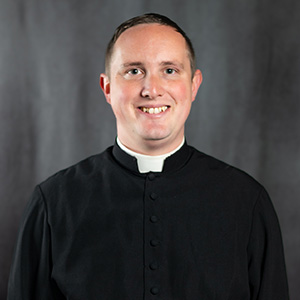 Home parish: St. Thomas Aquinas Church, Charlotte
Home parish: St. Thomas Aquinas Church, Charlotte
Birthplace: Little Rock, Arkansas
Raised in: Indian Trail
Age: 26
College: St. Joseph College Seminary
Favorite music: (Aside from anything sung in Church) “I listen to a lot of indie rock right now. I also listen to a lot of bluegrass, some country music. I grew up listening to a lot of country music, but I've sort of moved more toward the indie rock side of things.”
CNH: What has been your biggest challenge or struggle in living the faith?
Dimock: “The noisiness of the world is difficult to escape. My generation is often accused of having a short attention span, and those critics are correct! It’s a true reorientation to escape that noisiness, and cling to Christ Jesus in the silence of His Eucharistic Presence every day.”
CNH: How can priests today foster greater unity in the Church?
Dimock: “I hope that as a minister of the Word and preacher of the Gospel, I can take those truths that I have learned in seminary and give them to the People of God in a manner that they can comprehend. And that giving on of the Tradition, spoken of by St. Paul in 1 Corinthians 11:23, should be our model, and always accompanied by prayer.”
CNH: After you get ordained, what is the first thing you’re looking forward to doing?
Dimock: “I look forward to going on a multi-day hike without having to find Mass. After I get ordained, Mass goes along with me. I love hiking Grandfather Mountain in Linville and I’ve found some really beautiful hikes out in Brevard and up in Highlands and Sapphire.”
Father Christian Goduti
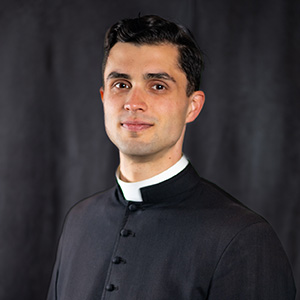 Home parish: St. Mark Church, Huntersville
Home parish: St. Mark Church, Huntersville
Birthplace: Charlotte
Raised in: Huntersville
Age: 25
College: St. Joseph College Seminary
Fun facts: Loves to cook, landscape and listen to audio books. Has listened to audio versions of the Bible. “The person who’s playing Jesus’ voice can throw it off, though. Not that you would have known what Jesus’ voice sounds like, but if it’s not necessarily the best voice for Him, it’s hard to just sit there. Maybe it’s better to just read the Gospels.”
CNH: What does faith mean to you personally?
Goduti: “Faith, believing in Jesus and His saving work, is necessary for our salvation. Faith is the gifted virtue by which we hold fast to Jesus Christ and all He has revealed. Personally, I am ever grateful to God for the gift of faith, and I ask the Blessed Mother for her intercession so that I may grow in this faith every day.”
CNH: What do you love most about the Catholic faith?
Goduti: “The Catholic faith has handed on through Scripture and tradition the treasured truth of the Eucharist. Our Lord Himself is present to us. It also hands on the beauty of the priesthood and the sacraments, of which the priest is a minister. I am ever grateful for the deposit of truth present in the Catholic Church."
CNH: After you get ordained, what is the first thing you’re looking forward to doing?
Goduti: “I know that after my first Mass and then the reception at the parish, we're going to have a family dinner, and I'm looking forward to that. I'm also making a pilgrimage to Fatima with my parents.”
Father Matthew Harrison II
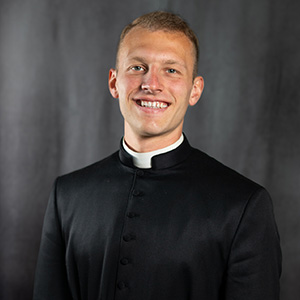 Home parish: Sacred Heart Church, Salisbury
Home parish: Sacred Heart Church, Salisbury
Birthplace: Richmond, Virginia
Raised in: North Carolina
Age: 26
College: St. Joseph College Seminary
Fun fact: Plays at least six instruments: guitar, mandolin, cello, piano, bagpipes and banjo, many self-taught. Family dinners often end with bluegrass jam sessions late into the night.
CNH: How did your family play a role in your discernment to the priesthood?
Harrison: “I am blessed to have an amazing family, and my process of discernment has heavily relied on their constant support, prayers and advice. My parents always encouraged me to serve at Mass growing up, always nurtured my desires and interest in the faith, and served as excellent models of the Christian life with their firm and constant love and joy."
CNH: What do you love most about the Catholic faith?
Harrison: “I love the communal nature of the sacraments. Coming together for Mass and singing to God, but then spending time afterward either with coffee and donuts or just chatting outside, is such an amazing privilege to be a part of. Our faith is built around the Body of Christ, and being a small part of that body is both fun and edifying.”
CNH: What do you see as the biggest challenge for the Church and the Diocese of Charlotte?
Harrison: “It seems to me the biggest challenge for the Church is the constant pursuit of Christ and holiness in a world that directly opposes that pursuit. Knowing what the Truth is, is one thing, but knowing who the Truth is, is much more important. It is crucial that we know Christ personally, and the best way this can happen is through silent prayer with Him.”
Father Kevin Martinez
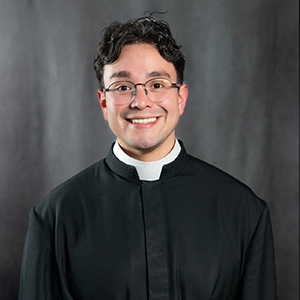 Home parish: St. Joseph Church, Asheboro
Home parish: St. Joseph Church, Asheboro
Birthplace: Asheboro
Raised in: Franklinville
Age: 26
College: St. Joseph College Seminary
Favorite food: Mom’s tacos, but loves everything mom makes.
CNH: Tell us about your family, where you grew up and how your family practiced the Catholic faith.
Martinez: “I am a first-generation American. My parents are from the same hometown in Mexico – specifically, El Rosario, Nayarit, Mexico. I was born in Asheboro but was raised on a farm in Franklinville. Until I entered seminary, I lived on the farm my whole life.
From very early on, my parents taught me the importance of the Catholic faith. Other things could be joked about, but Holy Mother Church was not to be joked about. The gravity and passion for the Church is something that was taught in my family. Although I didn’t always apply these properly throughout my earlier stages in life, my parents never failed me in teaching me what the Church taught.”
CNH: What do you love most about the Catholic faith?
Martinez: “I love the way we worship in the Catholic Church. It is Theocentric (God-centered). In other denominations, folks sit around and listen to a preacher deliver a sermon for an extended time.
In the Catholic Church, the efficaciousness of the worship is not dependent upon how well the priest delivers his homily. Our worship is centered around the Eucharist, the source and summit of our faith. The Mass is centered around the representation of Christ’s sacrifice for us. The Mass is the perfect act of worship, which is rendered to God the Father by Jesus Christ in the Holy Spirit. It is the unbloody sacrifice of Calvary, which takes place on the altar. This is what I love about the Catholic faith.”
CNH: How can priests today help foster greater unity in the Church?
Martinez: “By helping refocus people to realize what truly matters – furthering the kingdom of God upon Earth. During our earthly pilgrimage, we aim to know, love and serve God in this life and be with Him in the next. It is also our duty as baptized sons and daughters of the Father to bring as many souls as we can to God.”
Father José Palma Torres
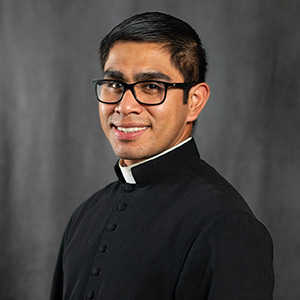 Home parish: St. Joseph Church, Asheboro
Home parish: St. Joseph Church, Asheboro
Birthplace: Veracruz, Mexico
Raised in: Randleman
Age: 30
College: St. Joseph College Seminary
Fun fact: Loves sports, dreamed of becoming a professional soccer player.
CNH: How did you live your faith in your young adult years, prior to discerning the seminary?
Palma Torres: “When I began taking my faith seriously, I started to pray by setting time in the mornings to read scripture. I had a job that was near my home parish, so I would often step into the church and pray before the tabernacle. Sometimes, I would stay there for up to an hour and sometimes it was just for a few minutes, but this practice was crucial in my discernment.”
CNH: What is one thing people would be surprised to know about you?
Palma Torres: “I have been blessed to learn different languages, so I can speak English, Spanish and Latin. I have also studied a little bit of Greek and some French."
CNH: What do you love most about the Catholic faith?
Palma Torres: “I love that the Catholic faith brings fulfillment to the ends for which man was created. In the faith, one worships God through the liturgy, which involves body and soul. One is able to know who God is through prayer, and one is also able to study theology and know about God. Faith and reason come together in a beautiful way so that everyone is able to know and love God.”
Father Elliott Suttle
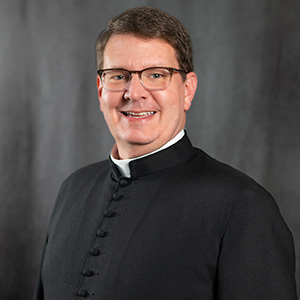 Home parish: St. Mary Help of Christians, Shelby
Home parish: St. Mary Help of Christians, Shelby
Birthplace: Lumberton
Raised in: Cherryville and Shelby
Age: 50
College: University of Alabama
Fun fact: Father Suttle collects hobbies: beer-making; car racing (watching and driving) ; hockey; fencing; hiking; backpacking; camping; archery; skateboarding; reading; writing short stories; board games.
CNH: What does faith mean to you personally?
Suttle: “I had to drive an hour each way to Mass every weekend when I lived in Japan. Even finding a parish in the first place was difficult because most don’t have websites. I also had to teach myself how to go to confession in Japanese due to the lack of English-speaking priests.”
CNH: How can priests today foster greater unity in the Church?
Suttle: “We need to demonstrate that the faith is bigger than any one of us. We all gravitate toward a spirituality or facet of the faith that speaks most to us. Just because my spirituality isn’t the same as yours doesn’t make us enemies, but rather just people who have different ways of relating to the same faith. Think of it this way: Franciscans, Dominicans and Benedictines all have very different ways of living out the Catholic faith. That doesn’t make one right and the others wrong. It just shows the breadth of the Catholic faith. That isn’t to say that anything you do is fine, however. You still have to ‘color within the lines,’ as it were. Having said all this, I will attempt to show people that, so long as you believe what the Church teaches to be true, we’re all working toward the same goal. We just go about it in different ways.”
Father Kevin Tran
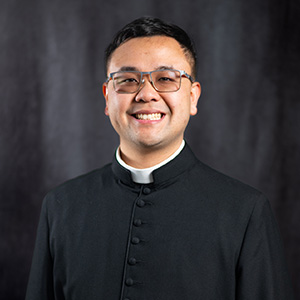 Home parish: St. John Neumann, Charlotte
Home parish: St. John Neumann, Charlotte
Birthplace and raised in: Charlotte
Age: 28
College:University of North Carolina, Charlotte
Favorite instrument: The trumpet. “I grew up playing the trumpet, and it’s the most quoted instrument in the Bible."
CNH: What do you see as the biggest challenge for the Church and for the Diocese of Charlotte?
Tran: “Thanks be to God that we in Charlotte have the problem of needing to expand and build. As immigrants continue to move to Charlotte, particularly Catholics from the northern states and Latin America, we should not assume they will be bringing a Catholic culture with them. Rather, the challenge in front of us will be the same as it has always been: evangelizing and re-evangelizing not just in deed but in word also.”
CNH: What do you love most about the Catholic faith?
Tran: “I love all the tangible signs we have of Christ’s promise that He would be with us to the end of the age, from the Paschal candle to the priesthood, to the Church herself and ultimately to the Blessed Sacrament itself.”


